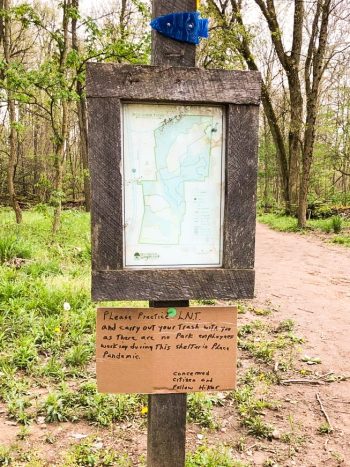A nice reminder to leave no trace of domain specific language.

Leave No Trace (LNT)
Article May 26, 2020
Carrie Nickels
This month on a hike at a local park, I came across this sign tacked under the park map: “Please Practice LNT and carry out your trash with you as there are no park employees working during this shelter in place pandemic. Concerned citizen and fellow hiker.”

LNT - Leave No Trace. It’s a phrase that’s thrown around in the outdoors culture pretty regularly, and it got me thinking. I understand what LNT stands for because my family and I are outdoors all the time and generally understand “outdoor culture” terms. But quite a few of the people going on hikes during quarantine - maybe even the majority right now - are people that don’t normally have the extra time to get out into nature. They likely have no clue what LNT stands for. Even people who do hike on a regular basis might not have ever heard the acronym LNT.
Literally on the home page for LNT.org - a website that encourages nature lovers to be aware of their presence and help protect and sustain the natural world around them - is a statistic: “9 out of 10 people in the outdoors are uninformed about their impacts.” They use this statistic to show that people aren’t aware that they can do a part to keep nature as clean and loved as possible. But I look at that statistic and think 9/10 people aren’t familiar with outdoor culture and the outdoor-related words that might be used. Maybe we should think to use terms that make sense to everyone and not just the 1/10 that do know the language.
And this is true for other fields too! Each field of work has their own “language” that they speak that makes sense to people in that field, but is complete gibberish to people outside of that field.
For example, in a mechanics shop you might hear “Make sure you have the alignment done on that E46 cause the camber looks a little out to me”. Or in a hospital you might hear “We need a PE for the F in 14 due to a NWB left leg”. Even my husband, who works at an Air Force Base might say “We need to come together to make sure we have the J&A, MRR, and SAS prepared for the RFP board so we can release the FOPR”.
And all those phrases make complete sense to the people in those respective fields. But they are all complete gibberish to me - an outsider of all those fields. I couldn’t even make a good guess as to what they mean. It’s literally like it’s in another language.
Which leads me to my main point - as UXers, designers, or people creating content for people who aren’t us... We need to be aware that not everyone understands what we’re saying!
When we’re creating content, we should be aware of the demographics of the people who are consuming the content. Are they in our field? Are they of the same reading level as us? Are they English as a first language? Yes? Cool! Use all the field-specific terms you want! But if the answer is no to any of those questions, then we should be using words and phrases that make sense to them too.
Looking for a guide on your journey?
Ready to explore how human-machine teaming can help to solve your complex problems? Let's talk. We're excited to hear your ideas and see where we can assist.
Let's Talk